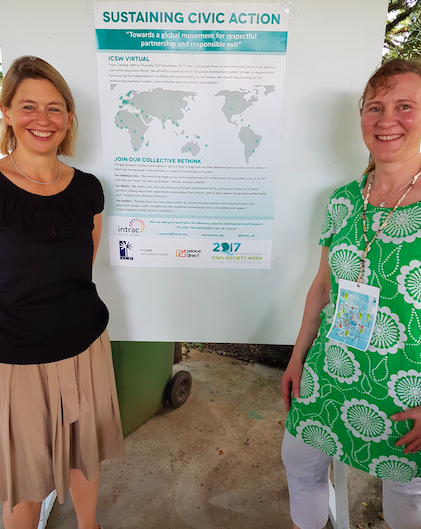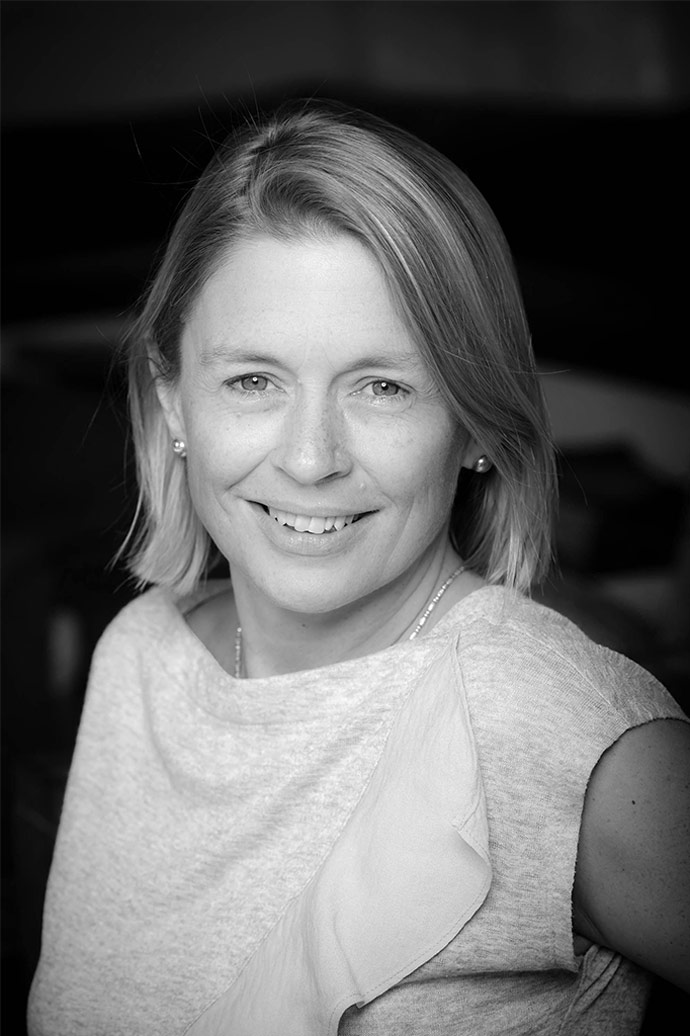The power of the donor: rethinking CSO partnerships
13 Dec 2017

Poster session at ICSW summarizing these discussions, Hodgson (L) & Auli Stark of Kepa (R)
The tension between local versus international NGOs, and the power of the donor in the development sector, was at the heart of an online webinar and forum organized by INTRAC in partnership with the Instituto de Comunicación y Desarrollo, Peace Direct and Y Care International as part of CIVICUS’s International Civil Society Week 2017. The purpose was to generate thinking and shared experiences on how to “rethink partnerships, strengthen capacity for sustainability, and ensure a responsible approach to planning for aid exit” amongst NGO, funders and development practitioners.
With the reality that traditional development assistance from OECD countries is shrinking, especially in middle-income countries, and while INGOs continue to monopolize the bulk of charity fundraising in rich countries, the question of how southern NGOs and civil society can sustain their work to tackle poverty and exclusion is become more and more critical. The webinar set the scene for what became a participatory discussion with contributions from key partners in the sector. While it was acknowledged local context was important in the analysis, Cathal Gilbert from CIVICUS helped to set the broader global scenethat illustrated how civil society all over the world is working under more and more restrictive conditions.
Nicole Leotard of CANARI, a national organization working in the Caribbean detailed how partnership with local actors begins on an unequal footing, as funders define the objectives, the terms, and deliverables, seeing them as an implementing partner, burdening them not only with lots of paperwork but also undermining local agency and context. Jessie Davie, from Maliasilli, provided an overview around how they provide technical and operational support to environmental campaigners in Africa, seeing their role as building capacity for local grassroots action. They have recently produced their own partnership toolkit that focuses on how to design strong healthy relationships with African CSOs working in Natural Resources and Conservation.
While there are a lot of examples of bad practice around how local NGOs often become preoccupied with donor driven service delivery projects, there was general agreement there needs to be real change to the way partnerships, funding and civil society support was provided and accountability measured. As Jenny Hodgson, GFCF Executive Director, critiqued part of the problem lie in the “overall design of the current funding system” and the extent to which it creates “winners” and “losers” that emphasizes “scale”, focused on a few big institutions who can deliver, versus those more devolved, networked or eco-system approaches.
Kathy Reich’s presentation of the Ford Foundations BUILD (Building Institutions and Networks) Initiative provided an overview of their ambitious plan to invest in local solutions. With a $1 billion investment in the long-term capacity and sustainability of up to 300 social justice organizations around the world over a five-year period, they aim to strengthen them and make them more effective in reducing inequality. As Jenny Hodgson reflected in the follow up online discussion with “unrestricted, institutional development grants that support civil society organizations over time are few and far between in the donor world, the Ford Foundation’s BUILD programme is a refreshing addition to the funder mix.” But she also raised concerns that these types of large sources of international funding and the power it represents, can potentially undermine southern civil society’s ability to wean itself off its dependency.
The discussion explored how funding could be diversified and blended to incorporate both traditional “vertical” systems of accountability to external donors to ones that included a local constituency and funding base with more of a “horizontal” accountability to people in their communities. In addition to the power of community philanthropy, USAID’s Local Works was highlighted as an example of how a large bilateral donor could invest in locally driven and led initiatives.
INTRAC has followed up to the online forum discussion by setting a up a virtual working group that seeks to see how to further build support for ‘localization’ beyond the humanitarian sector; to encourage public and private funders to support CSOs in ways that enable them to diversify their resource base and increase their power in relation to partners and government.

